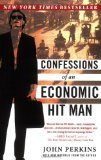“Confessions of an Economic Hit Man” is a book by John Perkins describing his work as a purported economist for a large engineering firm (MAIN) that allegedly colluded with politicians and other such firms to spread America's hegemony as an economic super-power. This was done in part by convincing corrupt political leaders in poor countries to take on onerous loans from the World Bank and other such institutions in the name of development and extracting concessions for the business of American companies in such countries when their loans became difficult to service for them.
The author defines the term “Economic Hit Man” as follows:
Economic hit men (EHMs) are highly-paid professionals who cheat countries around the globe out of trillions of dollars. They funnel money from the World Bank, the U.S. Agency for International Development (USAID), and other foreign “aid” organizations into the coffers of huge corporations and the pockets of a few wealthy families who control the planet's natural resources. Their tools included fraudulent financial reports, rigged elections, payoffs, extortion, sex, and murder. They play a game as old as empire, but one that has taken on new and terrifying dimensions during this time of globalization.
According to the author, the goal of such economic hit men is to further the global empire of corporations, banks and governments (collectively called “corporatocray” by the author, an unwieldy term that he insists on using throughout the book). If a political leader they target turns out to be incorruptible or not pliable, the “jackals” (CIA operatives) are sent in to assassinate them and replace them with a puppet leader, who very often turns out to be a despot. These operations were carried out in all countries that could help further American business interests - from countries in Central and Latin America, to the Middle East and to the Far East.
If a country did not need foreign aid, for example an oil-rich country like Saudi Arabia, America would still convince its leaders to give business to its firms in the name of modernization of the country. Thus money spent on a country, and much more, would eventually come back to America as business profits, whether the money was originally spent on loans to the country or as payments for oil. In recent times with countries like China that export a lot to America, the money still finds its way back to America as China purchases large amounts of American Treasury securities. It helps tremendously that the American dollar is the international reserve currency, since it does not get hit by a country defaulting on a loan or its own obligations on its loans - it can simply print more money to take care of these situations.
The problem with this book is that there is nothing startlingly-new that hasn't long been suspected by people upset by the American hegemony of recent times. For those that aren't, there isn't any concrete evidence in the book to convince them otherwise. You are thus most likely to hold the same viewpoint about American business interests as you held before reading this book. The author claims to have written a draft of this book in the early 1980s, but held back from publishing it because of threats and bribes. Now that it has finally been published, it does not contain any revelations that people haven't already been exposed to elsewhere, even in main-stream media outlets like The New York Times. It just seems like a lame attempt on part of the author to redeem the wrongs of the early part of his career by portraying his supposed constant struggle with his conscience during this period and his renunciation of this career-path thereafter.
This doesn't mean that there's no food for thought in this book. The generally-accepted business wisdom of pursuing growth for its own sake without more than a superficial regard for the depletion of natural resources and the impoverishment of millions of people, all for the sake of continually increasing business profits, must be challenged. The abuse of the power vested in a country by virtue of being the sole issuer of the only international reserve currency is something that needs to be checked.
